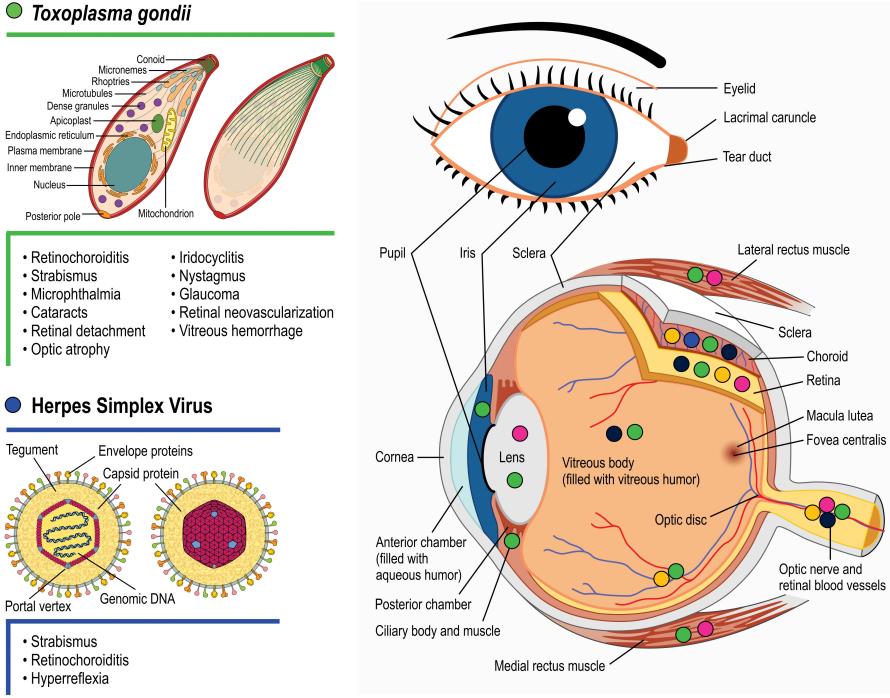As a leading CRO of antibody generation and development, Creative Biolabs offers application-specific antibody development services to global clients. With experienced scientists and advanced technology, we have established a series of high-quality in vitro diagnostic (IVD) antibody development services against biomarkers of different diseases. Here, we introduce our IVD antibody development services for TORCH infections.
TORCH (Toxoplasmosis, Other agents [T. pallidum, Varicella-zoster virus (VZV), Parvovirus B19], Rubellavirus, Cytomegalovirus (CMV), Herpes simplex virus (HSV), TORCH) refers to a group of infectious agents which can lead to TORCH syndrome when newborn infants are infected with one or more of the TORCH agents. Certain studies have suggested that several additional infectious agents such as enteroviruses, Borrelia burgdorferi (the cause of Lyme disease), and human immunodeficiency virus (HIV) should be considered in the other category. Infections with any of these TORCH agents such as rubella virus, toxoplasma gondii, herpes simplex viruses, and cytomegalovirus may cause a constellation of similar symptoms in newborns which contain fever, appearance of small reddish or purplish spots, yellowish discoloration of the skin, enlargement of the liver and spleen, jaundice, hearing impairment, and blindness.
 Fig.1 Main eye structures affected by TORCH agent during development (indicated by colored circles).1
Fig.1 Main eye structures affected by TORCH agent during development (indicated by colored circles).1
Common TORCH Infections
The common route of the fetus infection is through transplacental spread after maternal infection in which the agent circulates in the mother's blood. These infections within utero have more severe effects to the developing fetus than to the mother, which can cause fetal loss or result intrauterine growth restriction, prematurity, or chronic postnatal infection. The level of severity keeps associated with the virulence of the pathogens, damage to the placenta, gestational age of the fetus when infected, and the condition of maternal illness. Toxoplasmosis, most frequently acquired orally, is caused by the protozoan Toxoplasma gondii when eating contaminated raw meat or exposed to cat that carries pathogens. This infectious can lead infected infants to develop chorioretinitis when they are in young adulthood, which may result in blindness, obstructive hydrocephalus, and intracranial calcifications. Rubella is another common infection resulting TORCH symptoms which is characterized by an exanthema and posterior cervical lymphadenopathy. Other related infectious diseases like CMV, HSV-1, and HSV-2 also gain much attention.
Prevention for STDs
Incidence of TORCH infectious diseases has changed significantly as the development of health care, increasing awareness of hygiene and better preventive measures in recent years. Advanced molecular diagnostic techniques provide faster as well as more precise methods to detect the presence of pathogens, which also play an essential role in prenatal diagnosis. In addition, pregnant woman should try to keep as far away from the contaminated raw meat or potential pathogens carriers as possible.
Our IVD antibody development services target various TORCH infectious pathogens, including but not limited to:
If you are interested in our products or services, please feel free to contact us for more information and a detailed quote.
Reference
- Campos, Viviane Souza de, Karin C. Calaza, and Daniel Adesse. "Implications of TORCH diseases in retinal development—special focus on congenital toxoplasmosis." Frontiers in cellular and infection microbiology 10 (2020): 585727. Distributed under Open Access license CC BY 4.0. The image was modified by extracting and using only part of the original image.
For Research Use Only.